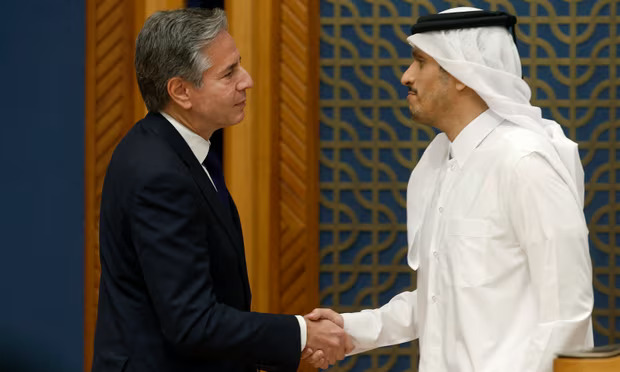By Robert Tait
The US secretary of state, Antony Blinken, has reportedly asked Qatar to moderate Al Jazeera’s coverage of Israel’s war against Hamas, amid concerns within the Biden administration that the channel is inflaming public opinion and heightening the risks of a wider conflict.
Blinken raised the satellite news channel’s coverage with the Qatari prime minister, Sheikh Mohammed bin Abdulrahman bin Jassim al-Thani, according to the website Axios, which said the US’s top diplomat had disclosed the request in a meeting with US Jewish leaders.
The US administration’s concern over the network reflects the high impact its coverage has on public opinion in the Arab world.
Al Jazeera is one of the few news organizations with a functioning bureau in Gaza, enabling it to report on the destructive impact of Israel’s heavy bombardment of the territory, which the Palestinian health ministry says has so far killed 7,028 people, nearly 3,000 of them minors.
This week Al Jazeera’s chief correspondent, Wael al-Dahdouh, became part of the unfolding story when his entire immediate family was killed in an Israeli airstrike on a house in the Nuseirat refugee camp, where they had relocated to after Israel’s warning on 13 October for residents to move from northern Gaza.
The network broadcast footage of al-Dahdouh breaking down in grief as he peered at the body of his son in the hospital morgue. His wife, daughter and grandson were also killed in Tuesday’s strike, along with 21 other people.
“They take revenge on us in our children?” he said, as he knelt over his son’s body.
In a statement, the network said it “strongly condemns the indiscriminate targeting and killing of innocent civilians in Gaza, which has led to the loss of Wael al-Dahdouh’s family and countless others”.
Another Al Jazeera journalist, Shireen Abu Akleh, was shot dead last year while reporting on an Israeli raid in the West Bank. The Israeli military subsequently admitted there was a “high probability” that one of its soldiers had shot her, after initially insisting she had been killed by Palestinian gunfire. A joint investigation conducted by Forensic Architecture and the Palestinian human rights group Al-Haq later alleged that she had been killed “deliberately” and Al Jazeera submitted a formal complaint to the International Criminal Court.
The Al Jazeera Media Network, which is funded by the Qatari royal family, insists it has editorial independence. But the network is widely seen by foreign governments as a soft-power tool for the Gulf monarchy.
Al Jazeera’s reporting has previously drawn accusations of inciting terrorism from the governments of Saudi Arabia, Egypt, the United Arab Emirates and Bahrain.
Last week, the Israeli government agreed to emergency measures that would lead to the closure of Al Jazeera’s office in Israel, on the grounds that its broadcasts promote Hamas and amount to “incitement.” The matter still must be given final approval by the security cabinet.
Trita Parsi, of the Washington-based Quincy Institute for Responsible Statecraft, said Al Jazeera was widely respected in the Arab world as an authoritative source on the current war because it had continued to focus on the Israeli-Palestinian conflict even after other Arab media outlets had scaled back their coverage.
“After the Arab spring, there was a general trend in which Arab societies turned inward—or in the case of the Syrian civil war, had their own problems—and the Israel-Palestine conflict fell down their priority list,” he said. “There was a faulty assumption that it had lost its potency in the Arab world, but it hadn’t—and Al Jazeera is well-positioned to cover it now because it never stopped covering it in the first place.”
Blinken’s comments about the network reportedly came during a visit to the Qatari capital, Doha, on 13 October, as he embarked on a frantic round of diplomacy aimed at limiting the fallout from Hamas’s deadly attacks on Israel six days earlier, which killed at least 1,400 people.
He identified Al Jazeera’s coverage as an example of what Qatar could do to change its friendly public posture towards Hamas, Axios reported.
Blinken asked Sheikh Mohammed to “turn down the volume on Al Jazeera’s coverage because it is full of anti-Israel incitement”, the website quoted one of its sources as saying.
No specific offending examples of the station’s output were given but it is thought Blinken was referring to its Arabic-language rather than its English-language channels.
Neither the US state department nor the Qatari foreign ministry has publicly commented.
Addressing a news conference alongside Sheikh Mohammed after their meeting, Blinken told journalists that there “could be no more business as usual with Hamas.”
The Gulf kingdom is home to two senior exiled Hamas leaders, Ismail Haniyeh and Khaled Mashal, who initially moved there after being expelled from Jordan by King Abdullah in 1999, two years after surviving an Israeli assassination attempt in the Jordanian capital, Amman.
Blinken’s complaints about Al-Jazeera are particularly sensitive because Qatar is deeply involved in negotiations to release hostages seized by Hamas from Israel and taken to Gaza in this month’s attack.
Last month, the country was also at the centre of a complex agreement between the US and Iran that resulted in the release of five long-term US detainees in Tehran in exchange for the Iranian government accessing $6 billion in oil revenues that had been frozen under sanctions imposed by the Trump administration.
However, the US subsequently reached a “quiet understanding” with Qatar to stop Iran from withdrawing the funds —which had been moved to a Qatari bank account—amid suspicions over a possible Iranian role in the Hamas attack.
Robert Tait is a freelance journalist based in Prague. He was previously the Guardian’s correspondent in Iran and Turkey.
Source: theguardian.com, October 27, 2023

